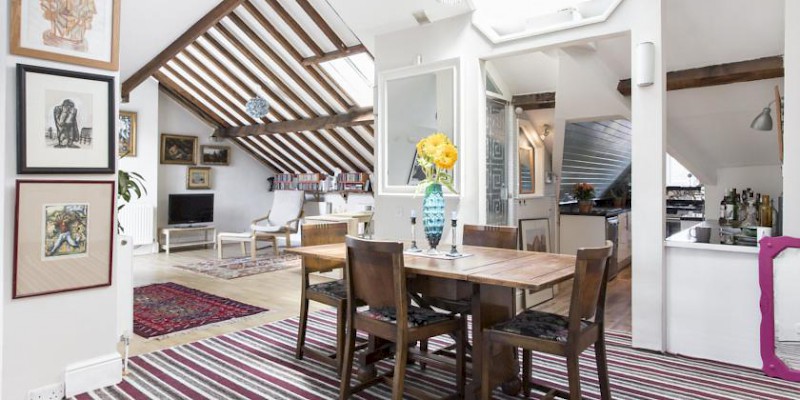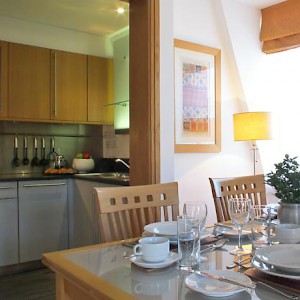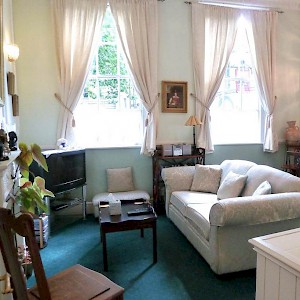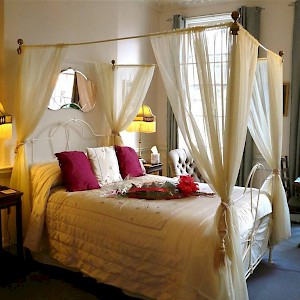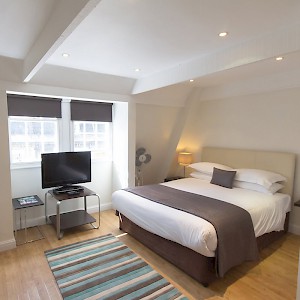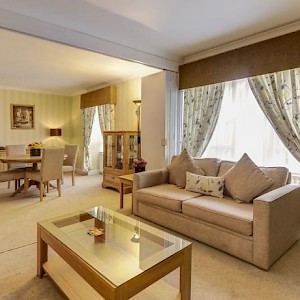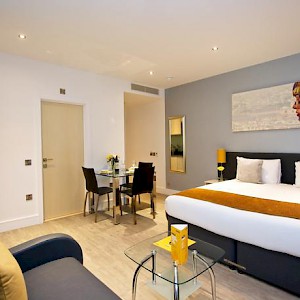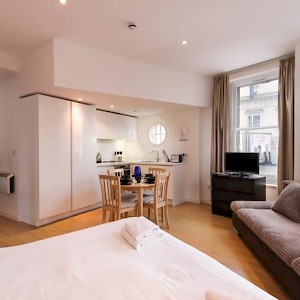Apartments (rental flats) ★★★
How to find and rent a vacation apartment (let a short-term flat) from $40 in the U.K.
Renting your own apartment on vacation will likely be as cheap—if not cheaper than—a hotel, plus will get you a kitchen and the other amenities of everyday life.
When I took my in-laws to England a few years ago, we rented a two-bedroom/two-bath flat in the very heart of London—right atop a Tube station, yet also walking distance from Covent Garden, SoHo, the West End, and the British Museum.
The apartment came with a full kitchen, satellite TV, a terrace, and free washer-dryer... and the week-long rental cost less than half the price of two double rooms at the nearby equivalent of a Motel 6.
Rental apartments rock.
How much does a rental flat in the U.K. cost?
You can get an apartment—even in London—for as little as £35 per night. But that's at the low end.
Expect to pay an average of:
- £60 to £200 per night for a moderate studio or one-bedroom apartment
- £120 to £300 for a two-bedroom flat
You will generally pay less per night the longer you stay.
Naturally, the price can vary widely, from plain-Jane flats to luxury apartments, and from city-center London to a small town, but that will give you a good ballpark.
Self-catering apartments are a particular bargain for families and small groups. While, yes, more bedrooms will cost you more, six people in a three-bedroom will usually pay less per-person than four people in a two-bedroom. Once you start splitting the cost five or six ways, apartments can be an incredible value.
(Actually, the majority of short-term rental flats have foldout sofas in the living rooms, so one bedroom per couple is overkill. A budget-minded family or foursome can usually book a one-bedroom and still have a bed for all, and five or six people can often make do with a two-bedroom.)
What a British apartment rental is like
The first thing most people get wrong about renting an apartment for their travels is they assume you can only rent one by the month. This is not so.
In fact, while some are available only on a monthly basis, the majority of vacation apartments are rented out by the week, or even for just three nights—and there are plenty that will rent to you for just a single night, especially in low season.
With you own pad, and a chance to try on the experience of living life as a local for a short while, shopping at the local stores and cooking meals in your own kitchen.
This helps you save money on dining expenses by limiting the number of meals you have to eat out at a restaurant; you avoid paying through the nose for a hotel breakfast, can dine at home some nights, and keep a stock of cheese, salamis, fruits, and veggies in the fridge for replenishing your daily picnic lunch supplies.
One hotel amenity you usually don't get with a short-term rental apartment is maid service—but do you really need fresh sheets every night?
Finding the perfect British flat
As usual, the best resource is usually the local tourist office, which almost always keeps a complete list of all rental apartments and short-term flats in the area—and, in the best cases, includes that list on its website with links.
That said, below are links and resources to help you find rental flats across the U.K.
Top rental flats in the U.K.
- Homeaway.com - So many places it doesn't even bother listing rentals past the first 5,000—and that's just in London.Partner
- Vrbo.com -
VRBO stands for "Vacation Rentals By Owner," a worldwide virtual classifieds section devoted to villas, apartments, cottages, houses, and other places to lay your head fromas little as $400 per week in England. There are a stunning 33,761 properties available in England, 4,896 in Scotland, and 5,123 in Wales.
Though designed to allow villa and vacation home owners to rent to the public directly—ostensibly cutting out the extra costs involved in working through a middle-man rental agency—in my experience plenty of small-fry local rental agencies use it as well (not that there's anything wrong with renting through those folks; just wanted to let you know that not every property listed is truly direct from the owner).
Partner - Booking.com - More than 10,800 apartments across the United Kingdom, including more than 4,300 in London.Partner
- Rentalo.com - Another sizeable database for one-stop shopping, with more than 2,600 properties across the U.K. They also handle everything from standard hotels to B&Bs, agriturism, and even castles.Partner
- Hotels.com - Good generalist booking engine with plenty of "Apartments" options in the filter screens for each destination.Partner
- Interhomeusa.com - 966 rentals in the U.K., of which 212 in London. Partner
- Villasintl.com - Around 770 rental homes and flats of all sizes across the U.K., mostly in England (561 in London) with about 100 in Scotland.
- Belvilla.com - 386 holiday cottages across the U.K., inlcuding 15 flats and homes in London.Partner
- Airbnb.com - Tens of thousands of listings—but caveat emptor. Anyone can post a listing, so trust only the ones with lots of reviews.
- Booking.com - More than 120 residence hotels, aparthotels, condo hotels, and townhouse suites in the U.K.Partner
- Hotels.comPartner
- Adagio-city.com - More than 290 residence hotels all across the United Kingdom.Partner
- Sacoapartments.com - Some 80,000 serviced flats in 160 locations around the world, including in 95 cities and town across in the U.K.
- Staybridge.com - Staybridge Suites condos from London to Liverpool, Birmingham to Newcastle-Upon-Tyne.Partner
- Gonative.com - 20 serviced flats in London, and partnerships with aparthotels in other UK cities.
Tips
- Week-long rentals are typical, though some apartments are available for two or three nights at a time, especially in the off-season (winter).
- Peak season is roughly Easter through October, plus Christmas season (Dec 15–Jan 6).
- Advanced reservations are essential. For summer high season, it's best to book several months, or even a full year, ahead.
- Every owner bends the rules sometimes, so even if a website states that an apartment only rents by the week or longer, or that rates are completely nonnegotiable, it never hurts to inquire about flexibility. Small agencies and owners who rent one or two apartments are particularly likely to bargain during slower periods.
- Bait and switch is pervasive when booking through an agency (as opposed to direct from the owner or a hotel)—whether intentional or because online databases aren't updated to reflect actual availability. Double-check that the apartment you want is the apartment you're getting. If the agency offers an alternative, make sure it's up to snuff and reasonably priced.
- A deposit may be necessary to hold your reservation. The amount varies: It might be the equivalent of one night's stay; it might be 30 to 50 percent of the total; it might be something totally different. The balance is due 6 to 20 days prior to arrival.
- Bank wire transfers are required to rent some apartments, particularly direct-from-owner units (agencies will usually let you use a credit card). If you're renting abroad, note that banks in the U.S. charge $30–$50 for an international transfer, and it'll take three to five business days to process.
- Taxes, utilities, and an initial and final cleaning fee are frequently included in the quoted price, but that's not always the case, so ask. If the apartment has a phone, inquire whether local calls cost extra.
- Expect to pay a deposit against potential damages, either through a hold on your credit card or in cash to the person who gives you the keys. The money will be refunded when you check out.
- Cancellation policies vary, with refunds given on a sliding scale, meaning less money is returned the later that you cancel. The deposit is rarely refundable, though you may be able to get some of the money back if you cancel far in advance.
- A representative will usually meet you at the apartment—though sometimes at a major landmark, train station, their own downtown office, or the local bus or metro stop nearest the apartment at a prearranged time. He or she will lead you to the flat, show you the ropes (which keys fit which locks, location of the fuse box), point out nearby markets and cafés, and provide a local number to call if you have questions.
- Most kitchens come fully equipped, but double-check that this is the case if you plan on cooking. Before heading to the market, look in the cabinets. There are often some cooking staples (salt, sugar, pasta, oil) left by former guests.
- Towels and linens are typically provided, but bring your own soap, shampoo, and toiletries; this is not a hotel.
- Cleaning service is rare, though a few rentals offer cleaning every three days or so. Remember: You're living like a local, which includes taking out the trash and recycling. Your host will provide a schedule.

